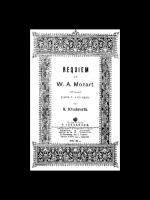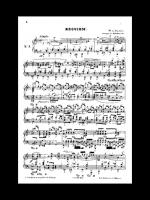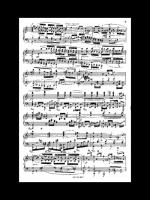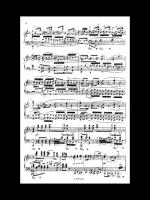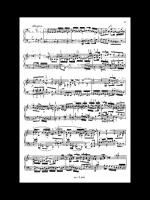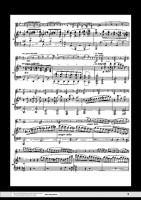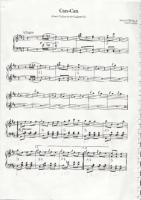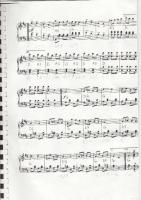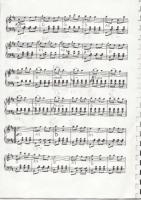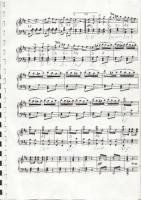Piano Sheet Music
 "Silence is the fabric upon which the notes are woven. " Lawrence Duncan
"Silence is the fabric upon which the notes are woven. " Lawrence Duncan
Mozart
 Wolfgang Amadeus Mozart, full name Johann Chrysostom Wolfgang Amadeus Mozart (27 January 1756 â 5 December 1791) was a prolific and influential composer of the Classical era. His over 600 compositions include works widely acknowledged as pinnacles of symphonic, concertante, chamber, piano, operatic, and choral music. Mozart is among the most enduringly popular of classical composers, and many of his works are part of the standard concert repertoire.
Wolfgang Amadeus Mozart, full name Johann Chrysostom Wolfgang Amadeus Mozart (27 January 1756 â 5 December 1791) was a prolific and influential composer of the Classical era. His over 600 compositions include works widely acknowledged as pinnacles of symphonic, concertante, chamber, piano, operatic, and choral music. Mozart is among the most enduringly popular of classical composers, and many of his works are part of the standard concert repertoire.Mozart's music, like Haydn's, stands as an archetypal example of the Classical style. His works spanned the period during which that style transformed from one exemplified by the style galant to one that began to incorporate some of the contrapuntal complexities of the late Baroque, complexities against which the galant style had been a reaction. Mozart's own stylistic development closely paralleled the development of the classical style as a whole. In addition, he was a versatile composer and wrote in almost every major genre, including symphony, opera, the solo concerto, chamber music including string quartet and string quintet, and the piano sonata. While none of these genres were new, the piano concerto was almost single-handedly developed and popularized by Mozart. He also wrote a great deal of religious music, including masses; and he composed many dances, divertimenti, serenades, and other forms of light entertainment.
The central traits of the classical style can be identified in Mozart's music. Clarity, balance, and transparency are hallmarks of his work.
Michel Camilo
 Michel Camilo (born April 4, 1954) is a pianist and composer from Santo Domingo, Dominican Republic. He is known as a great jazz, Latin and classical pianist with superb technical ability, and has played and recorded with many world-famous musicians. Michel lists some of his main influences as Chick Corea, Keith Jarrett, Oscar Peterson, Bill Evans, and Art Tatum.
Michel Camilo (born April 4, 1954) is a pianist and composer from Santo Domingo, Dominican Republic. He is known as a great jazz, Latin and classical pianist with superb technical ability, and has played and recorded with many world-famous musicians. Michel lists some of his main influences as Chick Corea, Keith Jarrett, Oscar Peterson, Bill Evans, and Art Tatum.Vanessa Carlton
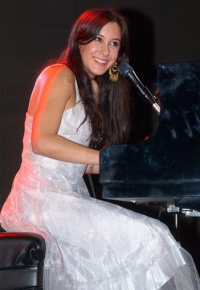 Vanessa Lee Carlton (born August 16, 1980) is an American soft rock/Piano pop singer, songwriter, and pianist best known for the Billboard top five, Grammy-nominated single "A Thousand Miles" from her debut album, Be Not Nobody which was released April 30, 2002, and certified platinum in the U.S.
Vanessa Lee Carlton (born August 16, 1980) is an American soft rock/Piano pop singer, songwriter, and pianist best known for the Billboard top five, Grammy-nominated single "A Thousand Miles" from her debut album, Be Not Nobody which was released April 30, 2002, and certified platinum in the U.S.Her music, along with that of her contemporary Michelle Branch to whom she is sometimes compared, has had an influence on female solo pop singer-songwriters in the 21st century, including Kate Voegele, Lights, Sara Bareilles (another piano pop artist), Colbie Caillat and Tristan Prettyman.
Carlton's second album, Harmonium (released November 9, 2004), debuted at number 33 on the U.S. Billboard 200 and had sold 179,000 copies as of February 2006, with the single "White Houses," peaking at 86 in the U.S. Billboard Hot 100. She subsequently parted company from her record label A&M, though she still holds a dedicated fanbase.
Her third album, Heroes and Thieves, was released on October 9, 2007 by the The Inc./Universal Motown record labels.
Rolf Harris
 Rolf Harris, CBE, AM (born 30 March 1930), is an Australian/British musician, singer, composer, painter, and television host and personality.
Rolf Harris, CBE, AM (born 30 March 1930), is an Australian/British musician, singer, composer, painter, and television host and personality.Harris has been credited with inventing a simple home-made instrument called the wobble board. This discovery was accidentally made in the course of his work when he attempted to dry a freshly painted hardboard with added heat, from hearing the sound made by the board as he shook it by the short edges to cool it off. He suggests the effect can best be obtained through faint bouncing of a tempered hardboard or a thinner MDF board between the palms of one's hands.
Rimsky-Korsakoff
 Nikolai Andreyevich Rimsky-Korsakov, also Nikolay, Nicolai, and Rimsky-Korsakoff, (18 March 1908) was a Russian composer, one of Russian composers known as "The Five", and was later a teacher of harmony and orchestration. He is particularly noted for a predilection for folk and fairy-tale subjects, and for his extraordinary skill in orchestration, which may have been influenced by his synesthesia. The first part of his surname, Rimsky, is due to the fact that some of his forefathers undertook a pilgrimage to Rome.
Nikolai Andreyevich Rimsky-Korsakov, also Nikolay, Nicolai, and Rimsky-Korsakoff, (18 March 1908) was a Russian composer, one of Russian composers known as "The Five", and was later a teacher of harmony and orchestration. He is particularly noted for a predilection for folk and fairy-tale subjects, and for his extraordinary skill in orchestration, which may have been influenced by his synesthesia. The first part of his surname, Rimsky, is due to the fact that some of his forefathers undertook a pilgrimage to Rome.Like his compatriot Cui, he expended his greatest efforts on his 15 operas. Subjects range from historical melodramas (The Tsar's Bride) to folk operas (May Night) to fairytales and legends (Snowmaiden, Kashchey the Immortal and The Tale of Tsar Saltan). In juxtaposed depictions of real and fantastic, the operas invoke folk melodies, realistic declamation, lyrical melodies, and artificially-constructed harmonies with effective orchestral expression. Most of Rimsky-Korsakov's operas remain in the standard repertoire in Russia to this day. While the operas themselves are not well-known in the West, many selections are familiar to Western audiences. These excerpts include "The Dance of the Tumblers" from Snowmaiden, "Procession of the Nobles" from Mlada, "Song of the Indian Guest" (or, less accurately, "Song of India,") from Sadko, and "Flight of the Bumblebee" from Tsar Saltan, as well as suites from The Golden Cockerel and The Legend of the Invisible City of Kitezh and the Maiden Fevroniya.
Rimsky-Korsakov's status in the West has long been based on his orchestral compositions. Best known among these are Capriccio espagnol, Russian Easter Festival Overture, and the symphonic suite Scheherazade. Scheherazade is often cited as a textbook example of Russian orientalism. Likewise, while Capriccio espagnol could be considered a continuation of Glinka's Spanish Fantasies pittoresques, the vibrancy of Rimsky-Korsakov's orchestration far outshines Glinka's effort. It also served as a model for Maurice Ravel's Rapsodie espagnole.
Smaller-scaled works include dozens of art songs, arrangements of folk songs, some chamber and piano music, and a considerable number of choral works, both secular and for Russian Orthodox Church service, including settings of portions of the Liturgy of St. John Chrysostom (the latter despite his staunch atheism).
Victor Young
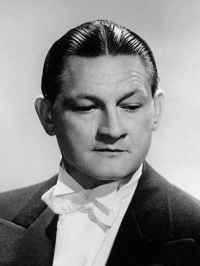 Victor Young was an American composer, arranger, violinist and conductor. Born: August 8, 1900, Chicago, Illinois, United States Died: November 10, 1956, Palm Springs, California, United States Spouse: Rita Kinel (m. 1922–1956)
Victor Young was an American composer, arranger, violinist and conductor. Born: August 8, 1900, Chicago, Illinois, United States Died: November 10, 1956, Palm Springs, California, United States Spouse: Rita Kinel (m. 1922–1956)Albums: Themes and Songs from The Quiet Man,
Brahms
 Johannes Brahms (May 7, 1833 â April 3, 1897) was a German composer of the Romantic period. He was born in Hamburg and in his later years he settled in Vienna, Austria.
Johannes Brahms (May 7, 1833 â April 3, 1897) was a German composer of the Romantic period. He was born in Hamburg and in his later years he settled in Vienna, Austria.Brahms maintained a Classical sense of form and order in his works â in contrast to the opulence of the music of many of his contemporaries. Thus many admirers (though not necessarily Brahms himself) saw him as the champion of traditional forms and "pure music," as opposed to the New German embrace of program music.
Brahms venerated Beethoven: in the composer's home, a marble bust of Beethoven looked down on the spot where he composed, and some passages in his works are reminiscent of Beethoven's style. The main theme of the finale of Brahms's First Symphony is reminiscent of the main theme of the finale of Beethoven's Ninth, and when this resemblance was pointed out to Brahms he replied that any ass â jeder Esel â could see that.
Ein deutsches Requiem was partially inspired by his mother's death in 1865, but also incorporates material from a Symphony he started in 1854, but abandoned following Schumann's suicide attempt. He once wrote that the Requiem "belonged to Schumann". The first movement of this abandoned Symphony was re-worked as the first movement of the First Piano Concerto.
Brahms also loved the Classical composers Mozart and Haydn. He collected first editions and autographs of their works, and edited performing editions. He also studied the music of pre-classical composers, including Giovanni Gabrieli, Johann Adolph Hasse, Heinrich Schütz and especially Johann Sebastian Bach. His friends included leading musicologists, and with Friedrich Chrysander he edited an edition of the works of François Couperin. He looked to older music for inspiration in the arts of strict counterpoint; the themes of some of his works are modelled on Baroque sources, such as Bach's The Art of Fugue in the fugal finale of Cello Sonata No. 1, or the same composer's Cantata No. 150 in the passacaglia theme of the Fourth Symphony's finale.
Franz Schubert
 Franz Peter Schubert (German pronunciation: ; January 31, 1797 – November 19, 1828) was an Austrian composer. He wrote some 600 Lieder, nine symphonies (including the famous "Unfinished Symphony"), liturgical music, operas, some incidental music, and a large body of chamber and solo piano music. He is particularly noted for his original melodic and harmonic writing.
Franz Peter Schubert (German pronunciation: ; January 31, 1797 – November 19, 1828) was an Austrian composer. He wrote some 600 Lieder, nine symphonies (including the famous "Unfinished Symphony"), liturgical music, operas, some incidental music, and a large body of chamber and solo piano music. He is particularly noted for his original melodic and harmonic writing.Schubert was born into a musical family, and received formal musical training through much of his childhood. While Schubert had a close circle of friends and associates who admired his work (amongst them the prominent singer Johann Michael Vogl), wide appreciation of his music during his lifetime was limited at best. He was never able to secure adequate permanent employment, and for most of his career he relied on the support of friends and family. He made some money from published works, and occasionally gave private musical instruction. In the last year of his life he began to receive wider acclaim. He died at the age of 31 of "typhoid fever", a diagnosis which was vague at the time; several scholars suspect the real illness was tertiary syphilis.
Interest in Schubert's work increased dramatically in the decades following his death. Composers like Franz Liszt, Robert Schumann and Felix Mendelssohn discovered, collected, and championed his works in the 19th century, as did musicologist Sir George Grove. Franz Schubert is now widely considered to be one of the greatest composers in the Western tradition.
Chess
 Chess is a musical with lyrics by Tim Rice and music by Björn Ulvaeus and Benny Andersson, formerly of ABBA. The story involves a romantic triangle between two players in a world chess championship, and a woman who manages one and falls in love with the other. Although the protagonists were not intended to represent any specific individuals, the characters’ personalities are loosely based on those of Victor Korchnoi and Bobby Fischer.
Chess is a musical with lyrics by Tim Rice and music by Björn Ulvaeus and Benny Andersson, formerly of ABBA. The story involves a romantic triangle between two players in a world chess championship, and a woman who manages one and falls in love with the other. Although the protagonists were not intended to represent any specific individuals, the characters’ personalities are loosely based on those of Victor Korchnoi and Bobby Fischer.Following the pattern of Jesus Christ Superstar and Evita, a concept album of Chess was recorded in 1984, and generated a number of hit singles. The first theatrical version of Chess opened in London's West End in 1986 and played for three years. A much-altered production premiered on Broadway in 1988, but most critics gave it a poor reception, and it failed to attract large audiences. In spite of this failure in the United States, Chess, like Candide and other "cult" musicals, is frequently revised for new productions, many of which try to merge elements from both the London and Broadway versions.
Chess came seventh in a BBC Radio 2 listener poll of the United Kingdom's "Number One Essential Musicals."
Bill Evans
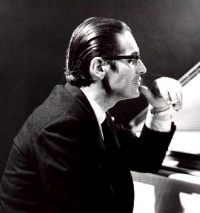 William John Evans, known as Bill Evans (August 16, 1929 – September 15, 1980) was an American jazz pianist. His use of impressionist harmony, inventive interpretation of traditional jazz repertoire, and trademark rhythmically independent, "singing" melodic lines influenced a generation of pianists, including Chick Corea, Herbie Hancock, John Taylor, Steve Kuhn, Don Friedman, Denny Zeitlin, Bobo Stenson and Keith Jarrett, as well as guitarists Lenny Breau and Pat Metheny. The music of Bill Evans continues to inspire younger pianists like Marcin Wasilewski, Fred Hersch, Ray Reach, Bill Charlap, Lyle Mays, Eliane Elias and arguably Brad Mehldau, early in his career.
William John Evans, known as Bill Evans (August 16, 1929 – September 15, 1980) was an American jazz pianist. His use of impressionist harmony, inventive interpretation of traditional jazz repertoire, and trademark rhythmically independent, "singing" melodic lines influenced a generation of pianists, including Chick Corea, Herbie Hancock, John Taylor, Steve Kuhn, Don Friedman, Denny Zeitlin, Bobo Stenson and Keith Jarrett, as well as guitarists Lenny Breau and Pat Metheny. The music of Bill Evans continues to inspire younger pianists like Marcin Wasilewski, Fred Hersch, Ray Reach, Bill Charlap, Lyle Mays, Eliane Elias and arguably Brad Mehldau, early in his career.Evans is an inductee of the Down Beat Jazz Hall of Fame.
Colbie Caillat
 Colbie Marie Caillat (born May 28, 1985 in Newbury Park, California) is an American pop singer-songwriter and guitarist from Malibu, California. Her father, Ken Caillat, co-produced Fleetwood Mac's Rumours and Tusk albums; Caillat recalls being around the likes of Mick Fleetwood and John McVie as a child.
Colbie Marie Caillat (born May 28, 1985 in Newbury Park, California) is an American pop singer-songwriter and guitarist from Malibu, California. Her father, Ken Caillat, co-produced Fleetwood Mac's Rumours and Tusk albums; Caillat recalls being around the likes of Mick Fleetwood and John McVie as a child.The popularity of Caillat's MySpace profile led her to become the number-one unsigned singer in her genre for four months. Her popularity on the social network was partially due to her song "Bubbly," and the songs on her profile have been played more than forty-two million times (as of May 31, 2008). For the week of July 17, 2007, "Bubbly" was featured on the iTunes Store as the free "Single of the Week". The promotion coincided with the release of Coco, her debut studio album. Caillat was also spotlighted by Rhapsody during the 2007 Black Friday Sale at Best Buy.
According to her MySpace profile, Caillat was first inspired to start singing at age 11 when she first heard the Fugees' 1996 version of the song "Killing Me Softly", made famous by Roberta Flack in 1973. Her MySpace profile also states that, though trained at piano from an early age, Caillat did not begin playing guitar until age nineteen. She also auditioned at least once for the television show American Idol, but never made it to the Hollywood rounds.
In May 2008, Caillat recorded a duet with Jason Mraz, called "Lucky," on his album, We Sing, We Dance, We Steal Things. The same month, Caillat recorded a cover of the song "Kiss the Girl" from The Little Mermaid for Disney's DisneyMania vol. 6 CD.
Caillat is currently shooting another music video in Hawaii for her song "The Little Things."
After touring with The Goo Goo Dolls and Lifehouse in 2007, she is now the supporting act for John Mayer in his 2008 Summer Tour.
Disney
 The Walt Disney Company (NYSE: DIS), often simply known as Disney, is the largest media and entertainment conglomerate in the world, known for its family-friendly products. Founded on October 16, 1923, by brothers Walt Disney and Roy Disney as an animation studio, it has become one of the biggest Hollywood studios, and owner and licensor of eleven theme parks and several television networks, including ABC and ESPN. Disney's corporate headquarters and primary production facilities are located at The Walt Disney Studios in Burbank, California. The company has been a component of the Dow Jones Industrial Average since May 6, 1991. Mickey Mouse serves as the official mascot of The Walt Disney Company.
The Walt Disney Company (NYSE: DIS), often simply known as Disney, is the largest media and entertainment conglomerate in the world, known for its family-friendly products. Founded on October 16, 1923, by brothers Walt Disney and Roy Disney as an animation studio, it has become one of the biggest Hollywood studios, and owner and licensor of eleven theme parks and several television networks, including ABC and ESPN. Disney's corporate headquarters and primary production facilities are located at The Walt Disney Studios in Burbank, California. The company has been a component of the Dow Jones Industrial Average since May 6, 1991. Mickey Mouse serves as the official mascot of The Walt Disney Company.
The Secret Garden
 The Secret Garden is a musical based on the 1909 novel of the same name by Frances Hodgson Burnett. The musical's book and lyrics are by Marsha Norman, with music by Lucy Simon. It premiered on Broadway at the St. James Theatre on 25 April 1991 and closed on 3 January 1993 after 709 performances.
The Secret Garden is a musical based on the 1909 novel of the same name by Frances Hodgson Burnett. The musical's book and lyrics are by Marsha Norman, with music by Lucy Simon. It premiered on Broadway at the St. James Theatre on 25 April 1991 and closed on 3 January 1993 after 709 performances.The musical, set in 1906, tells of a young English girl, Mary, who is forced to move to England from colonial India when her parents die in a cholera outbreak. There she lives with her emotionally stunted Uncle Archibald and her invalid cousin. Discovering a hidden and neglected garden, and bravely overcoming dark forces, she and a young gardener bring it back to life at the same time as she brings new life to her cousin and uncle.
The Secret Garden garnered the 1991 Tony Awards for Best Book of a Musical, Best Featured Actress in a Musical (Daisy Eagan), and Best Scenic Design (Heidi Landesman). The set resembled an enormous Victorian toy theatre with pop-out figures, large paper dolls, and Joseph Cornell-like collage elements.
Joni Mitchell
 Joni Mitchell was born on November 7, 1943, in Fort Macleod, Canada. In 1968, she recorded her first, self-titled album. Other highly successful albums followed. Mitchell won her first Grammy Award (best folk performance) for her 1969 album, Clouds. She has won seven more Grammy Awards since then, in several different categories, including traditional pop, pop music and lifetime achievement.
Joni Mitchell was born on November 7, 1943, in Fort Macleod, Canada. In 1968, she recorded her first, self-titled album. Other highly successful albums followed. Mitchell won her first Grammy Award (best folk performance) for her 1969 album, Clouds. She has won seven more Grammy Awards since then, in several different categories, including traditional pop, pop music and lifetime achievement.
Ernesto Lecuona
 Ernesto Lecuona y Casado (Spanish pronunciation: ; August 6, 1895 – November 29, 1963) was a Cuban composer and pianist of worldwide fame. He composed over six hundred pieces, mostly in the Cuban vein, and was a pianist of exceptional skill. His father was Canarian and his mother was Cuban.
Ernesto Lecuona y Casado (Spanish pronunciation: ; August 6, 1895 – November 29, 1963) was a Cuban composer and pianist of worldwide fame. He composed over six hundred pieces, mostly in the Cuban vein, and was a pianist of exceptional skill. His father was Canarian and his mother was Cuban.
Queen
 Queen were an English rock band formed in 1970 in London by guitarist Brian May, lead vocalist Freddie Mercury, and drummer Roger Taylor, with bass guitarist John Deacon completing the lineup the following year. While it is uncertain how many albums the band has sold, estimations range from 130 million to over 300 million albums worldwide.
Queen were an English rock band formed in 1970 in London by guitarist Brian May, lead vocalist Freddie Mercury, and drummer Roger Taylor, with bass guitarist John Deacon completing the lineup the following year. While it is uncertain how many albums the band has sold, estimations range from 130 million to over 300 million albums worldwide.The band is noted for their musical diversity, multi-layered arrangements, vocal harmonies, and incorporation of audience participation into their live performances. Their 1985 Live Aid performance was voted the best live rock performance of all time in an industry poll.
Queen had moderate success in the early 1970s, with the albums Queen and Queen II, but it was with the release of Sheer Heart Attack in 1974 and A Night at the Opera the following year that the band gained international success. They have released fifteen studio albums, five live albums, and numerous compilation albums. Eighteen of these have reached number one on charts around the world.
Following Mercury's death in 1991 and Deacon's retirement later in the decade, May and Taylor have performed infrequently under the Queen name. Since 2005 they have been collaborating with Paul Rodgers, under the moniker Queen + Paul Rodgers.
Paul McCartney
 Sir James Paul McCartney, MBE (born 18 June 1942) is an English rock singer, bass guitarist, songwriter, composer, multi-instrumentalist, entrepreneur, record producer, film producer and animal-rights activist. He gained worldwide fame as a member of The Beatles, with John Lennon, George Harrison, and Ringo Starr. McCartney and Lennon formed one of the most influential and successful songwriting partnerships and "wrote some of the most popular music in rock and roll history". After leaving The Beatles, McCartney launched a successful solo career and formed the band Wings with his first wife, Linda Eastman McCartney, and singer-songwriter Denny Laine. He has worked on film scores, classical music, and ambient/electronic music; released a large catalogue of songs as a solo artist; and taken part in projects to help international charities.
Sir James Paul McCartney, MBE (born 18 June 1942) is an English rock singer, bass guitarist, songwriter, composer, multi-instrumentalist, entrepreneur, record producer, film producer and animal-rights activist. He gained worldwide fame as a member of The Beatles, with John Lennon, George Harrison, and Ringo Starr. McCartney and Lennon formed one of the most influential and successful songwriting partnerships and "wrote some of the most popular music in rock and roll history". After leaving The Beatles, McCartney launched a successful solo career and formed the band Wings with his first wife, Linda Eastman McCartney, and singer-songwriter Denny Laine. He has worked on film scores, classical music, and ambient/electronic music; released a large catalogue of songs as a solo artist; and taken part in projects to help international charities.McCartney is listed in Guinness World Records as the most successful musician and composer in popular music history, with 60 gold discs and sales of 100 million singles. His song "Yesterday" is listed as the most covered song in history - by over 3,700 artists so far - and has been played more than 7,000,000 times on American television and radio. Wings' 1977 single "Mull of Kintyre" became the first single to sell more than two million copies in the UK, and remains the UK's top selling non-charity single. (Three charity singles have since surpassed it in sales; the first to do so—in 1984—was Band Aid's "Do They Know It's Christmas?", whose participants included McCartney.)
His company MPL Communications owns the copyrights to more than 3,000 songs, including all of the songs written by Buddy Holly, along with the publishing rights to such musicals as Guys and Dolls, A Chorus Line, and Grease. McCartney is also an advocate for animal rights, vegetarianism, and music education; he is active in campaigns against landmines, seal hunting, and Third World debt.
Kansas
 Kansas is an American progressive rock band which became a popular arena rock group in the 1970s, with hit singles such as "Carry On Wayward Son" and "Dust in the Wind". Kansas has remained a classic rock radio staple and a popular touring act in North America and Europe.
Kansas is an American progressive rock band which became a popular arena rock group in the 1970s, with hit singles such as "Carry On Wayward Son" and "Dust in the Wind". Kansas has remained a classic rock radio staple and a popular touring act in North America and Europe.
Yanni
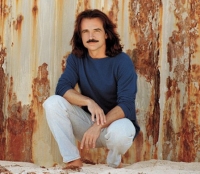 Yanni (born Yiannis Hrysomallis (pronounced Chrysomallis), (Greek: Γιάννης Χρυσομάλλης, classical transcription Giannis Chrysomallis), on November 14, 1954 in Kalamata, Greece) is a self-taught pianist, keyboardist, and composer. After receiving a B.A. in psychology, he would instead seek a life in music though he had no formal training and could not read a note.
Yanni (born Yiannis Hrysomallis (pronounced Chrysomallis), (Greek: Γιάννης Χρυσομάλλης, classical transcription Giannis Chrysomallis), on November 14, 1954 in Kalamata, Greece) is a self-taught pianist, keyboardist, and composer. After receiving a B.A. in psychology, he would instead seek a life in music though he had no formal training and could not read a note.He earned Grammy nominations for his 1992 album, Dare to Dream, and the 1993 follow-up, In My Time. His breakthrough success came with the 1994 release of Yanni Live at the Acropolis, deemed to be the second best-selling music video of all time, (behind Michael Jackson's video for Thriller with nine million units). Yanni has since performed live in concert before in excess of two million people in more than 20 countries around the world. He has accumulated more than 35 platinum and gold albums globally, with sales totaling over 20 million copies. Yanni is considered to be one of the top fundraisers of all time for public television. His compositions have been included in all Olympic Games television broadcasts since 1988, and his music has been used extensively in television and televised sporting events. His music is frequently described as "new age", though he prefers the term "contemporary instrumental". The regents of the University of Minnesota conferred upon Yanni the honorary degree of Doctor of Humane Letters.
Lineu Soares
 Lineu Soares in Piano from the São Judas Tadeu University (1988) and master in Music from the State University of Campinas (2012). He is currently a University Professor at the Adventist University Center of São Paulo.
Lineu Soares in Piano from the São Judas Tadeu University (1988) and master in Music from the State University of Campinas (2012). He is currently a University Professor at the Adventist University Center of São Paulo.
Arcangelo Corelli
 Arcangelo Corelli (17 February 1653 – 8 January 1713) was an Italian violinist and composer of Baroque music.
Arcangelo Corelli (17 February 1653 – 8 January 1713) was an Italian violinist and composer of Baroque music.Corelli was born at Fusignano, in the current-day province of Ravenna, although at the time it was in the province of Ferrara. Little is known about his early life. His master on the violin was Giovanni Battista Bassani. Matteo Simonelli, the well-known singer of the pope’s chapel, taught him composition.
He gained his first major success in Paris at the age of nineteen, and to this he owed his European reputation. From Paris, Corelli went to Germany. In 1681 he was in the service of the electoral prince of Bavaria; between 1680 and 1685 he spent a considerable time in the house of his friend and fellow violinist-composer Cristiano Farinelli (believed to be the uncle of the celebrated castrato Farinelli).
In 1685 Corelli was in Rome, where he led the festival performances of music for Queen Christina of Sweden, and he was also a favorite of Cardinal Pietro Ottoboni, grandnephew of another Cardinal Pietro Ottoboni, who in 1689 became Pope Alexander VIII. From 1689 to 1690 he was in Modena; the Duke of Modena was generous to him. In 1708 he returned to Rome, living in the palace of Cardinal Ottoboni. His visit to Naples, at the invitation of the king, took place in the same year.
The style of execution introduced by Corelli and preserved by his pupils, such as Francesco Geminiani, Pietro Locatelli, and many others, was of vital importance for the development of violin playing. It has been said that the paths of all of the famous violinist-composers of 18th-century Italy led to Arcangelo Corelli who was their "iconic point of reference." (Toussaint Loviko, in the program notes to Italian Violin Concertos, Veritas, 2003)
Charles Dancla
 Jean Baptiste Charles Dancla (19 December 1817 in Bagnères-de-Bigorre – 10 October 1907 in Tunis) was a French violinist and composer.
Jean Baptiste Charles Dancla (19 December 1817 in Bagnères-de-Bigorre – 10 October 1907 in Tunis) was a French violinist and composer.When Dancla was nine years old the violinist Pierre Rode in Bordeaux heard his music; he was so impressed that he sent a recommendation letter to Pierre Baillot, Luigi Cherubini and Rodolphe Kreutzer. Thus Dancla became pupil to Paris conservatoires with Baillot for violin and with the opera composer Fromental Halévy for composition. He was strongly shaped by Niccolò Paganini, who experienced him in 1830, as well as by Henri Vieuxtemps. From 1835 onward Dancla was solo violinist in that Paris opera, and shortly thereafter he became concert master. In the year 1857 he was made a Professor to Paris conservatoires, where he was a successful teacher for over 35 years.
His two brothers were Arnaud Dancla (1819-1862), Cellist and author of a considerable cello teaching method, and Leopold Dancla (1822-1895), Violinist and composer of chamber music.
Franz Doppler
 Albert Franz Doppler, was a flute virtuoso and a composer best known for his flute music. He also wrote one German and several Hungarian operas for Budapest, all produced with great success. His ballet music was popular during his lifetime
Albert Franz Doppler, was a flute virtuoso and a composer best known for his flute music. He also wrote one German and several Hungarian operas for Budapest, all produced with great success. His ballet music was popular during his lifetime
Evanescence
 Evanescence is an American rock band founded in Little Rock, Arkansas in 1995 by singer/pianist Amy Lee and guitarist Ben Moody.
Evanescence is an American rock band founded in Little Rock, Arkansas in 1995 by singer/pianist Amy Lee and guitarist Ben Moody.After recording two private EPs and a demo CD named Origin, with the help of Bigwig Enterprises in 2000, the band released their first full-length album, Fallen, on Wind-up Records in 2003. Fallen sold more than 15 million copies worldwide and helped the band win two Grammy Awards. A year later, Evanescence released their first live album, Anywhere but Home, which sold more than one million copies worldwide. In 2006, the band released their second studio album, The Open Door, which has sold more than four million copies.
The band has suffered several line-up changes, including co-founder Moody leaving in 2003, followed by guitarist John LeCompt and drummer Rocky Gray in 2007. Lee is now the only original member of Evanescence remaining in the band.
Michael Giacchino
 Michael Giacchino (Italian pronunciation: ; born October 10, 1967) is an American composer who has composed scores for movies, television series and video games. Some of his most notable works include the scores to television series such as Lost, Alias and Fringe, games such as the Medal of Honor and Call of Duty series, and films such as Mission: Impossible III, The Incredibles, Star Trek, Star Trek Into Darkness, Cloverfield, Ratatouille, Up, Super 8, Cars 2, 50/50, and John Carter. Giacchino has received numerous awards for his work, including an Emmy, multiple Grammys, a Golden Globe Award, and an Academy Award.
Michael Giacchino (Italian pronunciation: ; born October 10, 1967) is an American composer who has composed scores for movies, television series and video games. Some of his most notable works include the scores to television series such as Lost, Alias and Fringe, games such as the Medal of Honor and Call of Duty series, and films such as Mission: Impossible III, The Incredibles, Star Trek, Star Trek Into Darkness, Cloverfield, Ratatouille, Up, Super 8, Cars 2, 50/50, and John Carter. Giacchino has received numerous awards for his work, including an Emmy, multiple Grammys, a Golden Globe Award, and an Academy Award.
Alberto Ginastera
 Alberto Evaristo Ginastera (April 11, 1916 – June 25, 1983) was an Argentine composer of classical music. He is considered one of the most important Latin American classical composers.
Alberto Evaristo Ginastera (April 11, 1916 – June 25, 1983) was an Argentine composer of classical music. He is considered one of the most important Latin American classical composers.Ginastera grouped his music into three periods: "Objective Nationalism" (1934–1948), "Subjective Nationalism" (1948–1958), and "Neo-Expressionism" (1958–1983). Among other distinguishing features, these periods vary in their use of traditional Argentine musical elements. His Objective Nationalistic works often integrate Argentine folk themes in a straightforward fashion, while works in the later periods incorporate traditional elements in increasingly abstracted forms.
The progressive rock group Emerson, Lake & Palmer brought Ginastera attention outside of modern classical music circles when they adapted the fourth movement of his first piano concerto and recorded it on their popular album Brain Salad Surgery under the title "Toccata". They recorded the piece not only with Ginastera's permission, but with his endorsement. In 1973, when they were recording the album, Keith Emerson met with Ginastera at his home in Switzerland and played a recording of his arrangement for him. Ginastera is reported to have said, "Diabolical!". Emerson misunderstood Ginastera's meaning: Ginastera spoke almost no English and meant that their interpretation was frightening, which had been his intent when he wrote it; Emerson, being British, took it to mean "awful". Emerson was so upset that he was prepared to scrap the piece until Ginastera's wife intervened saying that he approved. Ginastera later said, "You have captured the essence of my music, and no one's ever done that before." This experience is detailed in the liner notes to Brain Salad Surgery. Emerson would later go on to release an adaptation of one of the pieces from Ginastera's Suite de Danzas Criollas entitled "Creole Dance". "Toccata" also gained fame as the theme to the New England cult TV show Creature Double Feature. Italian neo-classical electric guitarist Alex Masi has also recorded an adaptation of "Toccata," one strongly based on the aforementioned ELP version, rather than the original orchestral piece. It can be found on 1989's "Attack of the Neon Shark".
His Cantata para América Mágica (1960), for dramatic soprano and 53 percussion instruments, was based on ancient pre-Columbian legends. Its West Coast premier was performed by the Los Angeles Percussion Ensemble under Henri Temianka and William Kraft at UCLA in 1963.
Jacques Brel
 Jacques Romain Georges Brel (April 8, 1929 – October 9, 1978) was a Belgian French-speaking singer-songwriter. The quality and style of his lyrics are highly regarded by many leading critics of popular music.
Jacques Romain Georges Brel (April 8, 1929 – October 9, 1978) was a Belgian French-speaking singer-songwriter. The quality and style of his lyrics are highly regarded by many leading critics of popular music.Brel's songs are not especially well known in the English-speaking world except in translation and through the interpretations of other singers, most famously Scott Walker and Judy Collins. Others who have sung his work in English include Marc Almond, Dave Van Ronk, Alex Harvey, David Bowie, Dusty Springfield, The Dresden Dolls, Frank Sinatra, Terry Jacks, Nina Simone, Rod McKuen, The Kingston Trio, Gavin Friday, Jack Lukeman, Dax Riggs and Beirut. In French-speaking countries, Brel is also remembered as an actor and director.
Van Morrison
 George Ivan Morrison OBE (generally known as Van Morrison) (born 31 August 1945) is a Grammy Award-winning Northern Irish singer, songwriter, author, poet and multi-instrumentalist, who has been a professional musician since the late 1950s. He plays a variety of instruments, including the guitar, harmonica, keyboards, drums, and saxophone. Featuring his characteristic growl—a unique mix of folk, blues, soul, jazz, gospel, and Ulster Scots Celtic influences—Morrison is widely considered one of the most unusual and influential vocalists in the history of rock and roll. Critic Greil Marcus has gone so far as to say that "no white man sings like Van Morrison."
George Ivan Morrison OBE (generally known as Van Morrison) (born 31 August 1945) is a Grammy Award-winning Northern Irish singer, songwriter, author, poet and multi-instrumentalist, who has been a professional musician since the late 1950s. He plays a variety of instruments, including the guitar, harmonica, keyboards, drums, and saxophone. Featuring his characteristic growl—a unique mix of folk, blues, soul, jazz, gospel, and Ulster Scots Celtic influences—Morrison is widely considered one of the most unusual and influential vocalists in the history of rock and roll. Critic Greil Marcus has gone so far as to say that "no white man sings like Van Morrison."Known as "Van the Man" by his fans, Morrison first rose to prominence as the lead singer of the Northern Irish band Them, writing their 1964 garage rock classic hit, "Gloria". A few years later, Morrison left the band and embarked on a successful solo career.
Morrison has pursued an idiosyncratic musical path. Much of his music is tightly structured around the conventions of American soul and R&B, such as the popular singles, "Brown Eyed Girl", "Moondance", "Domino" and "Wild Night". An equal part of his catalogue consists of lengthy, loosely connected, spiritually inspired musical journeys that show the influence of Celtic tradition, jazz, and stream-of-consciousness narrative, such as his classic album Astral Weeks and lesser known works such as Veedon Fleece and Common One. The two strains together are sometimes referred to as "Celtic Soul".
Morrison's career, spanning some five decades, has influenced many popular musical artists. He was inducted into the Rock and Roll Hall of Fame in 1993 and the Songwriters Hall of Fame in 2003. In 2000, Morrison ranked number twenty-fifth on American cable music channel VH1's list of its "100 Greatest Artists of Rock and Roll", and in 2004, Rolling Stone magazine ranked Van Morrison forty-second on their list of "Greatest Artists of All Time". Paste ranked him twentieth in their list of "100 Greatest Living Songwriters" in 2006 and Q ranked him twenty-second on their list of "100 Greatest Singers" in April 2007.
Liszt
 Franz Liszt (October 22, 1811 – July 31, 1886) was a Hungarian composer, virtuoso pianist and teacher.
Franz Liszt (October 22, 1811 – July 31, 1886) was a Hungarian composer, virtuoso pianist and teacher.Liszt became renowned throughout Europe for his great skill as a performer; to this day, many consider him to have been the greatest pianist in history. He was also an important and influential composer, a notable piano teacher, a conductor who contributed significantly to the modern development of the art, and a benefactor to other composers and performers, notably Richard Wagner and Hector Berlioz.
As a composer, Liszt was one of the most prominent representatives of the "Neudeutsche Schule" ("New German School"). He left behind a huge and diverse oeuvre, in which he influenced his forward-looking contemporaries and anticipated some 20th-century ideas and trends. Some of his most notable contributions were the invention of the symphonic poem, developing the concept of thematic transformation as part of his experiments in musical form and making radical departures in harmony.
Liszt has most frequently been credited to have been the first pianist who gave concerts with programs consisting only of solo pieces. An example is a concert he gave on March 9, 1839, at the Palazzo Poli in Rome. Since Liszt could not find singers who — following the usual habit of the time — should have completed the program, he played four numbers all alone.
Liszt was a prolific composer. Most of his music is for the piano and much of it requires formidable technique.In his most famous and virtuosic works, he is the archetypal Romantic composer. Liszt pioneered the technique of thematic transformation, a method of development which was related to both the existing variation technique and to the new use of the Leitmotif by Richard Wagner. Liszt's piano works are usually divided into two classes. On the one hand, there are "original works", and on the other hand "transcriptions", "paraphrases" or "fantasies" on works by other composers.
Gabriel Faure
 Gabriel Urbain Fauré (12 May 1845 – 4 November 1924) was a French composer, organist, pianist, and teacher. He was the foremost French composer of his generation, and his musical style influenced many 20th century composers. His harmonic and melodic language affected how harmony was later taught.
Gabriel Urbain Fauré (12 May 1845 – 4 November 1924) was a French composer, organist, pianist, and teacher. He was the foremost French composer of his generation, and his musical style influenced many 20th century composers. His harmonic and melodic language affected how harmony was later taught.Annie Lennox
 Annie Lennox (born 25 December 1954) is a Scottish musician, vocalist and Academy Award-winning songwriter. She is both a solo artist and the lead singer of the musical duo Eurythmics, hailed as "The Greatest White Soul Singer Alive" by members of the rock industry on the VH1 show 100 Greatest Women of Rock and Roll in 1999. Both as a solo artist and with Eurythmics, Lennox has sold 80 million records. Her vocal range is contralto.
Annie Lennox (born 25 December 1954) is a Scottish musician, vocalist and Academy Award-winning songwriter. She is both a solo artist and the lead singer of the musical duo Eurythmics, hailed as "The Greatest White Soul Singer Alive" by members of the rock industry on the VH1 show 100 Greatest Women of Rock and Roll in 1999. Both as a solo artist and with Eurythmics, Lennox has sold 80 million records. Her vocal range is contralto.
Felix Mendelssohn
 Jakob Ludwig Felix Mendelssohn Bartholdy, born, and generally known in English-speaking countries, as Felix Mendelssohn (February 3, 1809 – November 4, 1847) was a German composer, pianist, organist and conductor of the early Romantic period.
Jakob Ludwig Felix Mendelssohn Bartholdy, born, and generally known in English-speaking countries, as Felix Mendelssohn (February 3, 1809 – November 4, 1847) was a German composer, pianist, organist and conductor of the early Romantic period.The grandson of the philosopher Moses Mendelssohn, he was born into a notable Jewish family, although he himself was brought up initially without religion, and later as a Lutheran. He was recognized early as a musical prodigy, but his parents were cautious and did not seek to capitalise on his abilities. Indeed his father was disinclined to allow Felix to follow a musical career until it became clear that he intended to seriously dedicate himself to it.
Early success in Germany was followed by travel throughout Europe; Mendelssohn was particularly well received in England as a composer, conductor and soloist, and his ten visits there, during which many of his major works were premiered, form an important part of his adult career. His essentially conservative musical tastes however set him apart from many of his more adventurous musical contemporaries such as Liszt, Wagner and Berlioz. The Conservatory he founded at Leipzig became a bastion of this anti-radical outlook.
Mendelssohn's work includes symphonies, concerti, oratorios, piano and chamber music. He also had an important role in the revival of interest in the music of Johann Sebastian Bach. After a long period of relative denigration due to changing musical tastes and antisemitism in the late 19th and early 20th centuries, his creative originality is now being recognized and re-evaluated. He is now among the most popular composers of the Romantic era.
Beach boys
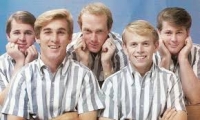 The Beach Boys are an American rock band formed in Hawthorne, California in 1961. The group's original lineup consisted of brothers Brian, Dennis, and Carl Wilson, their cousin Mike Love, and their friend Al Jardine. Distinguished by their vocal harmonies and early surf songs, they are one of the most influential acts of the rock era. The band drew on the music of jazz-based vocal groups, 1950s rock and roll, and black R&B to create their unique sound, and with Brian as composer, arranger, producer, and de facto leader, they often incorporated classical elements and unconventional recording techniques in innovative ways.
The Beach Boys are an American rock band formed in Hawthorne, California in 1961. The group's original lineup consisted of brothers Brian, Dennis, and Carl Wilson, their cousin Mike Love, and their friend Al Jardine. Distinguished by their vocal harmonies and early surf songs, they are one of the most influential acts of the rock era. The band drew on the music of jazz-based vocal groups, 1950s rock and roll, and black R&B to create their unique sound, and with Brian as composer, arranger, producer, and de facto leader, they often incorporated classical elements and unconventional recording techniques in innovative ways.
The Who
 The Who are an English rock band formed in 1964. The primary lineup consisted of vocalist Roger Daltrey, guitarist Pete Townshend, bassist John Entwistle, and drummer Keith Moon. They became known for energetic live performances including the pioneering spectacle of instrument destruction. The Who have sold about 100 million records and have charted 27 top forty singles in the United Kingdom and United States with 17 top ten albums, including 18 Gold, 12 Platinum and 5 Multi-Platinum album awards in the United States alone.
The Who are an English rock band formed in 1964. The primary lineup consisted of vocalist Roger Daltrey, guitarist Pete Townshend, bassist John Entwistle, and drummer Keith Moon. They became known for energetic live performances including the pioneering spectacle of instrument destruction. The Who have sold about 100 million records and have charted 27 top forty singles in the United Kingdom and United States with 17 top ten albums, including 18 Gold, 12 Platinum and 5 Multi-Platinum album awards in the United States alone.The Who rose to fame in the UK with a series of top ten hit singles, boosted in part by pirate radio stations such as Radio Caroline, beginning in January 1965 with "I Can't Explain". The albums My Generation (1965), A Quick One (1966) and The Who Sell Out (1967) followed, with the first two hitting the UK top five. They first hit the U.S. Top 40 in 1967 with "Happy Jack" and hit the top ten later that year with "I Can See for Miles". Their fame grew with memorable performances at the Monterey Pop and Woodstock music festivals. The 1969 release of Tommy was the first in a series of top ten albums in the U.S., followed by Live at Leeds (1970), Who's Next (1971), Quadrophenia (1973), The Who By Numbers (1975), Who Are You (1978) and The Kids Are Alright (1979).
Moon died at the age of 32 in 1978, after which the band released two studio albums, the UK and U.S. top five Face Dances (1981) and the U.S. top ten It's Hard (1982), with drummer Kenney Jones, before disbanding in 1983. They re-formed at events such as Live Aid and for reunion tours such as their 25th anniversary tour (1989) and the Quadrophenia tours of 1996 and 1997. In 2000, the three surviving original members discussed recording an album of new material, but their plans temporarily stalled upon Entwistle's death at the age of 57 in 2002. Townshend and Daltrey continue to perform as The Who, and in 2006 they released the studio album Endless Wire, which reached the top ten in the UK and U.S.
The Who were inducted into the Rock and Roll Hall of Fame in 1990, their first year of eligibility. Their display there describes them as "Prime contenders, in the minds of many, for the title of World's Greatest Rock Band." The Los Angeles Times wrote that during their tenure as a quartet, the band "rivaled The Beatles, Bob Dylan and The Rolling Stones as the most vital rock voice of youth." Time Magazine wrote in 1979 that "No other group has ever pushed rock so far, or asked so much from it." They received a Lifetime Achievement Award from the British Phonographic Industry in 1988, and from the Grammy Foundation in 2001. In 2008 surviving members Townshend and Daltrey were honoured at the 31st Annual Kennedy Center Honors.
Chopin
 Frédéric Chopin (1 March 1810 – 17 October 1849) was a Polish composer and virtuoso pianist of the Romantic period. He is widely regarded as the greatest Polish composer, and ranks as one of music's greatest tone poets.
Frédéric Chopin (1 March 1810 – 17 October 1849) was a Polish composer and virtuoso pianist of the Romantic period. He is widely regarded as the greatest Polish composer, and ranks as one of music's greatest tone poets.He was born in the village of Żelazowa Wola, in the Duchy of Warsaw, to a Polish mother and French-expatriate father, and in his early life was regarded as a child-prodigy pianist. In November 1830, at the age of 20, Chopin went abroad; following the suppression of the Polish November Uprising of 1830–31, he became one of many expatriates of the Polish "Great Emigration."
In Paris, he made a comfortable living as a composer and piano teacher, while giving few public performances. A Polish patriot,
Chopin's extant compositions were written primarily for the piano as a solo instrument. Though technically demanding, Chopin's style emphasizes nuance and expressive depth rather than virtuosity. Chopin invented musical forms such as the ballade and was responsible for major innovations in forms such as the piano sonata, waltz, nocturne, étude, impromptu and prelude. His works are mainstays of Romanticism in 19th-century classical music.
Bach
 Johann Sebastian Bach (31 March 1685 – 28 July 1750) was a German composer and organist whose sacred and secular works for choir, orchestra, and solo instruments drew together the strands of the Baroque period and brought it to its ultimate maturity. Although he introduced no new forms, he enriched the prevailing German style with a robust contrapuntal technique, an unrivalled control of harmonic and motivic organisation in composition for diverse musical forces, and the adaptation of rhythms and textures from abroad, particularly Italy and France.
Johann Sebastian Bach (31 March 1685 – 28 July 1750) was a German composer and organist whose sacred and secular works for choir, orchestra, and solo instruments drew together the strands of the Baroque period and brought it to its ultimate maturity. Although he introduced no new forms, he enriched the prevailing German style with a robust contrapuntal technique, an unrivalled control of harmonic and motivic organisation in composition for diverse musical forces, and the adaptation of rhythms and textures from abroad, particularly Italy and France.Revered for their intellectual depth and technical and artistic beauty, Bach's works include the Brandenburg concertos; the Goldberg Variations; the English Suites, French Suites, Partitas, and Well-Tempered Clavier; the Mass in B Minor; the St. Matthew Passion; the St. John Passion; The Musical Offering; The Art of Fugue; the Sonatas and Partitas for violin solo; the Cello Suites; more than 200 surviving cantatas; and a similar number of organ works, including the celebrated Toccata and Fugue in D Minor.
While Bach's fame as an organist was great during his lifetime, he was not particularly well-known as a composer. His adherence to Baroque forms and contrapuntal style was considered "old-fashioned" by his contemporaries, especially late in his career when the musical fashion tended towards Rococo and later Classical styles. A revival of interest and performances of his music began early in the 19th century, and he is now widely considered to be one of the greatest composers in the Western tradition.
Bee Gees
 The Bee Gees were a singing trio of brothers — Barry, Robin, and Maurice Gibb. They were born on the Isle of Man to English parents, lived in Chorlton, Manchester, England and during their childhood years moved to Brisbane, Australia, where they began their musical careers. Their worldwide success came when they returned to England and signed with producer Robert Stigwood.
The Bee Gees were a singing trio of brothers — Barry, Robin, and Maurice Gibb. They were born on the Isle of Man to English parents, lived in Chorlton, Manchester, England and during their childhood years moved to Brisbane, Australia, where they began their musical careers. Their worldwide success came when they returned to England and signed with producer Robert Stigwood.The multiple award-winning group was successful for most of its forty years of recording music, but it had two distinct periods of exceptional success: as a harmonic "soft rock" act in the late 1960s and early 1970s, and as the foremost stars of the disco music era in the late 1970s.
No matter the style, the Bee Gees sang three-part tight harmonies that were instantly recognizable; as brothers, their voices blended perfectly, in the same way that The Everly Brothers and Beach Boys did. Barry sang lead on many songs, and an R&B falsetto introduced in the disco years; Robin provided the clear vibrato lead that was a hallmark of their pre-disco music; Maurice sang high and low harmonies throughout their career. The three brothers co-wrote most of their hits, and they said that they felt like they became 'one person' when they were writing. The group's name was retired after Maurice died in January 2003.
The Bee Gees were inducted into The Rock and Roll Hall of Fame in 1997; fittingly, the presenter of the award to "Britain's first family of harmony" was Brian Wilson, leader of the Beach Boys, America's first family of rock harmony.
It has been estimated that the Bee Gees' record sales total more than 220 million, easily making them one of the best-selling music artists of all-time. The above figure in record sales does not include record sales for artists for whom they have written and with whom they have collaborated. Their 1997 Rock and Roll Hall of Fame citation says "Only Elvis Presley, The Beatles, Michael Jackson, Garth Brooks and Paul McCartney have outsold the Bee Gees".
Henryk Wieniawski
 Henryk Wieniawski (10 July 1835 – 31 March 1880) was a Polish violinist and composer. He was considered a violinist of genius and wrote some of the most important works in the violin repertoire, including two extremely difficult violin concertos, the second of which (in D minor, 1862) is more often performed than the first (in F♯ minor, 1853). His "L'Ecole Moderne, 10 Etudes-Caprices" is a very well known and required work for aspiring violinists. His Scherzo-Tarantelle, Op. 16 and Légende, Op. 17 are also frequently performed works. He also wrote two popular mazurkas for solo violin and piano accompaniment (the second one, Obertas, in G Major), using techniques such as left-hand pizzicato, harmonics, large leaps, and many double stops. Wieniawski has been given a number of posthumous honors. His portrait appeared on a postage stamp of Poland in 1952 and again in 1957. A 100 Złoty coin was issued in 1979 bearing his image.
Henryk Wieniawski (10 July 1835 – 31 March 1880) was a Polish violinist and composer. He was considered a violinist of genius and wrote some of the most important works in the violin repertoire, including two extremely difficult violin concertos, the second of which (in D minor, 1862) is more often performed than the first (in F♯ minor, 1853). His "L'Ecole Moderne, 10 Etudes-Caprices" is a very well known and required work for aspiring violinists. His Scherzo-Tarantelle, Op. 16 and Légende, Op. 17 are also frequently performed works. He also wrote two popular mazurkas for solo violin and piano accompaniment (the second one, Obertas, in G Major), using techniques such as left-hand pizzicato, harmonics, large leaps, and many double stops. Wieniawski has been given a number of posthumous honors. His portrait appeared on a postage stamp of Poland in 1952 and again in 1957. A 100 Złoty coin was issued in 1979 bearing his image.What is sometimes called the "Russian bow grip" ought to be called the "Wieniawski bow grip": Wieniawski taught his students his own kind of very stiff bowing that allowed him to play a "devil's staccato" with ease. This "devil's staccato" was easily used to discipline students.
Chaka Khan
 Chaka Khan (born Yvette Marie Stevens; March 23, 1953) is an American singer and composer who gained fame in the 1970s as the frontwoman and focal point of the funk band Rufus. While still a member of the group in 1978, Khan embarked on a successful solo career. Her signature hits, both with Rufus and as a solo performer, include "Tell Me Something Good", "Sweet Thing", "Ain't Nobody", "I'm Every Woman", "I Feel for You" and "Through the Fire".
Chaka Khan (born Yvette Marie Stevens; March 23, 1953) is an American singer and composer who gained fame in the 1970s as the frontwoman and focal point of the funk band Rufus. While still a member of the group in 1978, Khan embarked on a successful solo career. Her signature hits, both with Rufus and as a solo performer, include "Tell Me Something Good", "Sweet Thing", "Ain't Nobody", "I'm Every Woman", "I Feel for You" and "Through the Fire".
Whitesnake
 Whitesnake are an English hard rock band formed in 1978 by David Coverdale, after his departure from his previous band Deep Purple. Their early material has been compared by critics to the blues rock of Deep Purple, but they slowly began moving toward a more commercially accessible rock style. By the turn of the decade, the band's commercial fortunes changed and they released a string of UK top 10 albums, Ready an' Willing (1980), Come an' Get It (1981), Saints & Sinners (1982) and Slide It In (1984), the last of which was their first to chart in the US and is certified 2x platinum.
Whitesnake are an English hard rock band formed in 1978 by David Coverdale, after his departure from his previous band Deep Purple. Their early material has been compared by critics to the blues rock of Deep Purple, but they slowly began moving toward a more commercially accessible rock style. By the turn of the decade, the band's commercial fortunes changed and they released a string of UK top 10 albums, Ready an' Willing (1980), Come an' Get It (1981), Saints & Sinners (1982) and Slide It In (1984), the last of which was their first to chart in the US and is certified 2x platinum.The band's 1987 self-titled album was their most commercially successful worldwide, and contained two major US hits, "Here I Go Again" and "Is This Love", reaching number one and two on the Billboard Hot 100. The album went 8 times platinum in the US, and the band's success saw them nominated for the 1988 Brit Award for Best British Group. Slip of the Tongue (1989), was also a success, reaching the top 10 in the UK and the US, and received a platinum US certification. The band split up shortly after this release, but had a reunion in 1994, and released a one-off studio album, Restless Heart (1997).
Whitesnake officially reformed in 2002 and have been touring together since, releasing three albums, Good to Be Bad (2008), Forevermore (2011) and The Purple Album (2015). In 2005, Whitesnake were named the 85th greatest hard rock band of all time by VH1.
Teresa Teng
 Teresa Teng (January 29, 1953 – May 8, 1995; traditional Chinese: 鄧麗君; simplified Chinese: 邓丽君; pinyin: Dèng Lìjūn; Wade–Giles: Teng Li-chun; Pe̍h-ōe-jī: Tēng Lē-kun, Japanese: テレサ・テン) was a Taiwanese pop singer. Teng's voice and songs are instantly recognized throughout East Asia and in areas with large Asian populations. It is often said, "Wherever there are Chinese people, the songs of Teresa Teng can be heard." Her songs enjoy popularity among Indonesian, Japanese, Khmer, Korean, Malaysian, Thai and Vietnamese listeners as well.
Teresa Teng (January 29, 1953 – May 8, 1995; traditional Chinese: 鄧麗君; simplified Chinese: 邓丽君; pinyin: Dèng Lìjūn; Wade–Giles: Teng Li-chun; Pe̍h-ōe-jī: Tēng Lē-kun, Japanese: テレサ・テン) was a Taiwanese pop singer. Teng's voice and songs are instantly recognized throughout East Asia and in areas with large Asian populations. It is often said, "Wherever there are Chinese people, the songs of Teresa Teng can be heard." Her songs enjoy popularity among Indonesian, Japanese, Khmer, Korean, Malaysian, Thai and Vietnamese listeners as well.Teng was known for her folk songs and romantic ballads. Many became standards in her lifetime, such as "When Will You Return?" and "The Moon Represents My Heart". She recorded songs not only in her native Mandarin but also in Taiwanese Hokkien, Cantonese, Japanese, Indonesian, and English.
Teng, a lifelong sufferer from asthma, died in 1995 from a severe respiratory attack while on holiday in Thailand. She was 42.
Danny Elfman
 Daniel Robert "Danny" Elfman (born May 29, 1953) is an American musician, best known for composing music for television and movies, and leading the rock band Oingo Boingo as singer/songwriter from 1976 until its breakup in 1995. He is a frequent collaborator with long-time friend Tim Burton, and has scored all but two of his films. He was nominated for four Academy Awards and won a Grammy Award for Tim Burton's Batman and an Emmy Award for his Desperate Housewives theme. Elfman also wrote the theme for the video game Fable. He is also famous for creating The Simpsons main title theme, and his role as Jack Skellington's singing voice in The Nightmare Before Christmas. He is the Uncle in-law to actress Jenna Elfman.
Daniel Robert "Danny" Elfman (born May 29, 1953) is an American musician, best known for composing music for television and movies, and leading the rock band Oingo Boingo as singer/songwriter from 1976 until its breakup in 1995. He is a frequent collaborator with long-time friend Tim Burton, and has scored all but two of his films. He was nominated for four Academy Awards and won a Grammy Award for Tim Burton's Batman and an Emmy Award for his Desperate Housewives theme. Elfman also wrote the theme for the video game Fable. He is also famous for creating The Simpsons main title theme, and his role as Jack Skellington's singing voice in The Nightmare Before Christmas. He is the Uncle in-law to actress Jenna Elfman.Bruno Mars
 Peter Gene Hernandez (born October 8, 1985), better known by his stage name Bruno Mars, is an American singer-songwriter and music producer. Raised in Honolulu, Hawaii by a family of musicians, Mars began making music at a young age. After performing in various musical venues in his hometown throughout his childhood, he decided to pursue a musical career. Mars began producing songs for other artists, joining production team The Smeezingtons.
Peter Gene Hernandez (born October 8, 1985), better known by his stage name Bruno Mars, is an American singer-songwriter and music producer. Raised in Honolulu, Hawaii by a family of musicians, Mars began making music at a young age. After performing in various musical venues in his hometown throughout his childhood, he decided to pursue a musical career. Mars began producing songs for other artists, joining production team The Smeezingtons.He became recognized as a solo artist after lending his vocals and co-writing the hooks for the songs "Nothin' on You" by B.o.B, and "Billionaire" by Travie McCoy. He also co-wrote the hits "Right Round" by Flo Rida featuring Kesha, "Wavin' Flag" by K'naan, and "Fuck You!" by Cee Lo Green. In October 2010, he released his debut album, Doo-Wops & Hooligans. Anchored by the singles "Just the Way You Are" and "Grenade", the album peaked at number three on the Billboard 200. He has been nominated for seven Grammys at the 53rd Grammy Awards, which will be held on February 13, 2011.
Fleet Foxes
 Fleet Foxes is an American rock band formed in Seattle, Washington. Their first two albums were released by Sub Pop and Bella Union, with their third by Nonesuch and Bella Union.
Fleet Foxes is an American rock band formed in Seattle, Washington. Their first two albums were released by Sub Pop and Bella Union, with their third by Nonesuch and Bella Union.
Rumbling Hearts
 Rumbling Hearts is a Japanese adult visual novel developed by Âge and released on August 3, 2001 for Windows. It was later ported to the Dreamcast and PlayStation 2. ..... Kimi ga Nozomu Eien - Original Soundtrack
Rumbling Hearts is a Japanese adult visual novel developed by Âge and released on August 3, 2001 for Windows. It was later ported to the Dreamcast and PlayStation 2. ..... Kimi ga Nozomu Eien - Original Soundtrack
Traditional Catalan
Offenbach
 Jacques Offenbach (20 June 1819 – 5 October 1880) was a Prussian-born French composer, cellist and impresario. He is remembered for his nearly 100 operettas of the 1850s–1870s and his uncompleted opera The Tales of Hoffmann. He was a powerful influence on later composers of the operetta genre, particularly Johann Strauss, Jr. and Arthur Sullivan. His best-known works were continually revived during the 20th century, and many of his operettas continue to be staged in the 21st. The Tales of Hoffman remains part of the standard opera repertory.
Jacques Offenbach (20 June 1819 – 5 October 1880) was a Prussian-born French composer, cellist and impresario. He is remembered for his nearly 100 operettas of the 1850s–1870s and his uncompleted opera The Tales of Hoffmann. He was a powerful influence on later composers of the operetta genre, particularly Johann Strauss, Jr. and Arthur Sullivan. His best-known works were continually revived during the 20th century, and many of his operettas continue to be staged in the 21st. The Tales of Hoffman remains part of the standard opera repertory.
Wang Leehom
 Wang Leehom (born May 17, 1976), sometimes credited as Leehom Wang, is a Chinese-American singer-songwriter, record producer, actor and film director. He is currently based in Taiwan. Formally trained at the Eastman School of Music, Williams College and Berklee College of Music, his musical style is known for fusing Chinese elements (such as Beijing opera, traditional styles of ethnic minorities, Chinese classical orchestra) with hip-hop and R&B. Wang has been active since 1995 and contributed in 25 albums. He is also a four-time winner of Taiwan's Golden Melody Awards, the "Grammys" of Taiwanese music. His concert at the Beijing Bird's Nest on April 14, 2012 was the first solo pop concert to be held at the venue.
Wang Leehom (born May 17, 1976), sometimes credited as Leehom Wang, is a Chinese-American singer-songwriter, record producer, actor and film director. He is currently based in Taiwan. Formally trained at the Eastman School of Music, Williams College and Berklee College of Music, his musical style is known for fusing Chinese elements (such as Beijing opera, traditional styles of ethnic minorities, Chinese classical orchestra) with hip-hop and R&B. Wang has been active since 1995 and contributed in 25 albums. He is also a four-time winner of Taiwan's Golden Melody Awards, the "Grammys" of Taiwanese music. His concert at the Beijing Bird's Nest on April 14, 2012 was the first solo pop concert to be held at the venue.
John Lennon
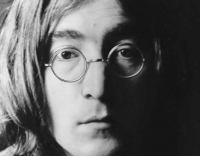 John Winston Ono Lennon, MBE (born John Winston Lennon; October 9, 1940 – December 8, 1980) was an English rock musician, singer, songwriter, artist, and peace activist who gained worldwide fame as one of the founding members of The Beatles. As a member of the group, Lennon was one of the lead vocalists and co-wrote many of the band's songs with Paul McCartney.
John Winston Ono Lennon, MBE (born John Winston Lennon; October 9, 1940 – December 8, 1980) was an English rock musician, singer, songwriter, artist, and peace activist who gained worldwide fame as one of the founding members of The Beatles. As a member of the group, Lennon was one of the lead vocalists and co-wrote many of the band's songs with Paul McCartney.In his solo career, Lennon wrote and recorded songs such as "Give Peace a Chance" and "Imagine". Lennon revealed his rebellious nature and wit on television, in films such as A Hard Day's Night, in books such as In His Own Write, and in press conferences and interviews. He was controversial through his work as a peace activist, artist, and author.
Lennon had two sons: Julian Lennon, with his first wife Cynthia Lennon, and Sean Ono Lennon, with his second wife, avant-garde artist Yoko Ono. After a self-imposed retirement from 1976 to 1980, Lennon reemerged with a comeback album, but was murdered one month later in New York City on 8 December 1980. In 2002, respondents to a BBC poll on the 100 Greatest Britons voted Lennon into eighth place. In 2004, Rolling Stone magazine ranked Lennon number 38 on its list of "The Immortals: The Fifty Greatest Artists of All Time" and ranked The Beatles at number one.
Yoshihiro Ike
 Yoshihiro Ike (池 頼広 Ike Yoshihiro, born August 25, 1963) is a Japanese composer, music arranger, and bassist. He is best known for his work on the background music on television series, video games, and Japanese animations. He has worked on more than 100 titles in the last 20 years. His most recognized composing works are AIBOU: Tokyo Detective Duo series (2002 - present), Kamichu! (2005), Kaseifu no Mita (2011), Tiger & Bunny (2011), Saint Seiya: Legend of Sanctuary (2014), Shadowverse (2016), B: The Beginning (2018), and Dororo (2019)
Yoshihiro Ike (池 頼広 Ike Yoshihiro, born August 25, 1963) is a Japanese composer, music arranger, and bassist. He is best known for his work on the background music on television series, video games, and Japanese animations. He has worked on more than 100 titles in the last 20 years. His most recognized composing works are AIBOU: Tokyo Detective Duo series (2002 - present), Kamichu! (2005), Kaseifu no Mita (2011), Tiger & Bunny (2011), Saint Seiya: Legend of Sanctuary (2014), Shadowverse (2016), B: The Beginning (2018), and Dororo (2019)
Cartel
 Cartel is a five-member American alternative rock band from Conyers, Georgia that formed in 2003. The band is best known for their track "Honestly", from their 2005 album Chroma, and for their appearance on MTV's Band in a Bubble.
Cartel is a five-member American alternative rock band from Conyers, Georgia that formed in 2003. The band is best known for their track "Honestly", from their 2005 album Chroma, and for their appearance on MTV's Band in a Bubble.The current members of the band include vocalist/guitarist Will Pugh, lead guitarist Joseph Pepper, guitarist Nic Hudson, bassist Jeff Lett, and drummer Kevin Sanders.
Elvis Costello
 Elvis Costello (born Declan Patrick MacManus, 25 August 1954) is an English singer-songwriter. He came to prominence as an early participant in London's pub rock scene in the mid-1970s and later became associated with the punk/New Wave genre. Steeped in word play, the vocabulary of Costello's lyrics is broader than that of most popular songs. His music has drawn on many diverse genres; one critic described him as a "pop encyclopedia", able to "reinvent the past in his own image".
Elvis Costello (born Declan Patrick MacManus, 25 August 1954) is an English singer-songwriter. He came to prominence as an early participant in London's pub rock scene in the mid-1970s and later became associated with the punk/New Wave genre. Steeped in word play, the vocabulary of Costello's lyrics is broader than that of most popular songs. His music has drawn on many diverse genres; one critic described him as a "pop encyclopedia", able to "reinvent the past in his own image".Costello has won multiple awards in his career, including a Grammy Award, and has twice been nominated for the Brit Award for Best British Male. In 2003, Elvis Costello & the Attractions was inducted into the Rock and Roll Hall of Fame. In 2004, Rolling Stone ranked Costello number 80 on their list of the 100 Greatest Artists of All Time.
Traditional
 traditional music
traditional music
Cat Stevens
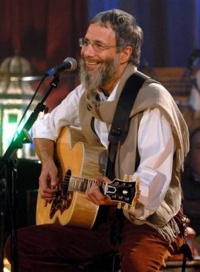 Yusuf Islam, (born Steven Demetre Georgiou on 21 July 1948), best known by his former stage name Cat Stevens, is a British musician of Greek Cypriot and Swedish ancestry. He is a singer-songwriter, multi-instrumentalist, educator, philanthropist and prominent convert to Islam.
Yusuf Islam, (born Steven Demetre Georgiou on 21 July 1948), best known by his former stage name Cat Stevens, is a British musician of Greek Cypriot and Swedish ancestry. He is a singer-songwriter, multi-instrumentalist, educator, philanthropist and prominent convert to Islam.As Cat Stevens, he sold over 60 million albums around the world since the late 1960s. His albums Tea for the Tillerman and Teaser and the Firecat were both certified as Triple Platinum by the RIAA in the United States (three million sales each); his album Catch Bull at Four sold half a million copies in the first two weeks of release alone, and was Billboard's number-one LP for three consecutive weeks. His songwriting has also earned him two ASCAP songwriting awards for "The First Cut Is the Deepest," which has been a hit single for five different artists, and has been instrumental for others in establishing their musical careers.
Stevens converted to Islam at the height of his fame in 1977. The following year, he adopted his Muslim name Yusuf Islam, sold all his instruments and awards for charity, and left his music career to devote himself to educational and philanthropic causes in the Muslim community. He turned to his mother to help him decide the best candidate to wed, and thus, in an arranged marriage, took his vows with Fauzia Mubarak Ali, eventually producing five living children from the union.
He has been given several awards for his work in promoting peace in the world, including 2003's World Award, the 2004 Man for Peace award, and the 2007 Mediterranean Prize for Peace. In 2006, he returned to pop music, with his first album of new pop songs in 28 years, entitled An Other Cup.
He lives with his wife, children and grand-child in London. Yusuf Islam spends part of each year in Dubai.
Dido
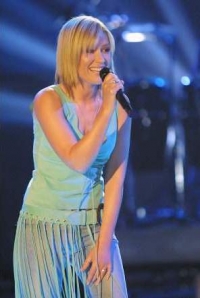 Dido Florian Cloud de Bounevialle O'Malley Armstrong (born 25 December 1971), is an English BRIT Award-winning and Grammy Award-nominated singer and songwriter.
Dido Florian Cloud de Bounevialle O'Malley Armstrong (born 25 December 1971), is an English BRIT Award-winning and Grammy Award-nominated singer and songwriter.Dido's mother, Claire (born Collins), is a French poet and her father, William O'Malley Armstrong (9 November 1938 – 22 December 2006) was an Irish publisher and former managing director of Sidgwick & Jackson.
Informally named after the mythical Carthaginian queen, Dido was educated at Thornhill Primary, City of London Girls' and Westminster School. Because she was born on Christmas Day, in childhood she celebrated, rather in the manner of the British monarch, an "official" birthday on 25 June.
After she stole a recorder from school at age five, her parents enrolled her at the Guildhall School of Music in London, England. By the time she reached her teens Dido had learned to play the piano, recorder and the violin. After her teens and whilst working as a literary agent, Dido studied law at Birkbeck, University of London, however, she never completed this course, deciding instead to take up music full-time. After learning the guitar, she showcased her skills to audiences during her 2004 Life for Rent tour.
Toon Hermans
 Antoine Gerard Theodore "Toon" Hermans (17 December 1916 – 22 April 2000) was a noted Dutch comedian, singer and writer.
Antoine Gerard Theodore "Toon" Hermans (17 December 1916 – 22 April 2000) was a noted Dutch comedian, singer and writer.Toon Hermans was born in Sittard. He began performing in the 1930s, achieving local, regional and, eventually, national fame in the Netherlands as a comedian during the post-war decades. Together with Wim Sonneveld and Wim Kan he was considered one of the "Great Three" of Dutch cabaret during the 1950s and 1960s.
Stephen Foster
 Stephen Collins Foster (July 4, 1826 – January 13, 1864), known as the "father of American music," was the pre-eminent songwriter in the United States of the 19th century. His songs, such as "Oh! Susanna", "Camptown Races", "Old Folks at Home" ("Swanee River"), "Hard Times Come Again No More", "My Old Kentucky Home", "Old Black Joe", and "Beautiful Dreamer", remain popular over 150 years after their composition.
Stephen Collins Foster (July 4, 1826 – January 13, 1864), known as the "father of American music," was the pre-eminent songwriter in the United States of the 19th century. His songs, such as "Oh! Susanna", "Camptown Races", "Old Folks at Home" ("Swanee River"), "Hard Times Come Again No More", "My Old Kentucky Home", "Old Black Joe", and "Beautiful Dreamer", remain popular over 150 years after their composition.Stephen Foster was inducted into the Songwriters Hall of Fame in 1970.
"My Old Kentucky Home" is the official state song of Kentucky, adopted by the General Assembly on March 19, 1928. "Old Folks at Home" is the official state song of Florida, designated in 1935.
The melody of Foster's "Old Dog Tray" is incorporated into Puccini's opera La Fanciulla del West (as the aria Che faranno).
Eighteen of Foster's compositions were recorded and released on the Beautiful Dreamer: The Songs of Stephen Foster collection. Among the artists that are featured on the album are John Prine, Alison Krauss, Yo Yo Ma, Roger McGuinn, Mavis Staples and Suzy Bogguss. The album won the Grammy for Best Traditional Folk Album in 2005.
Douglas Jimerson, a tenor from Baltimore who has released CD's of music from the Civil War era, released Stephen Foster's America in 1998.
American singer-songwriter Chris Stuart penned and recorded "Dear Friends and Gentle Hearts," a mournful song about Foster's sad fate.
American classical composer Charles Ives freely quoted a wide variety of Foster's songs in many of his own works.
A Squirrel Nut Zippers song titled "The Ghost of Stephen Foster" features references to his most famous works, including "Camptown Races".
Search for Free Sheet Music
You can make a search through the entire collection of sheets.
You can make a search through the entire collection of sheets.

